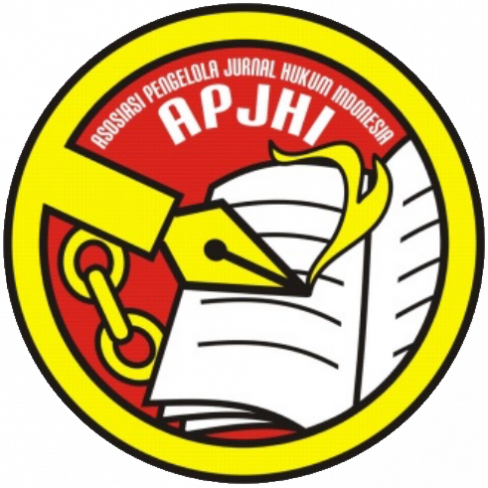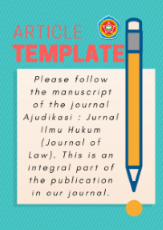Kedudukan Anak dari Perkawinan Berbeda Agama menurut Hukum Perkawinan Indonesia
DOI:
https://doi.org/10.30656/ajudikasi.v2i1.574Abstract
Article 2 paragraph  (1) of Law Number 1 Year 1974 contains provisions that marriage shall be considered valid if done according to the law of their respective religion and belief. The above provision implies no marriage outside the law of each of his or her religion and belief. Intermarriages between people of different religions will obviously cause problems as a result of the law of their marriage, most of which include the rights and duties of each husband and wife, property in marriage, as well as the position of the child in a marriage relationship. Problems will arise when the child has been born starting from the pattern of upbringing until when the child is adult and ably performs legal acts such as marriage, inheritance, and so forth. This research is intended to get answers to the problems: (1) How the position of the Child from Marriage parents of different religions? 2) How does the child's relationship with her parents' parent if the child chooses a religion differently from both parents? The invention of the answer to this question is pursued by the Empirical Normative Legal Research Method. The law acts as a Norm (Legislation), with due regard to social reality. The results of the study are: (1) The marriage of religious differences according to the Marriage Law is considered invalid as well as the child born of the Marriage. (2) A child born of a different religious marriage only has a nasab with his mother.
Downloads
References
Buku-buku :
Al Jabri, Abdul Muta’al. Apa Bahayanya Menikah dengan Wanita Nonmuslim? Tinjauan Fiqh dan Politik. Jakarta : Gema Insani Press, 2003
Eoh, O.S. Perkawinan antar Agama dalam Teori dan Praktek. Jakarta : PT. RajaGrafindo Persada, 2001
Halim, Abdul. Politik Hukum Islam di Indonesia : Kajian Posisi Hukum Islam dalam Politik Hukum Pemerintahan Orde Baru dan Era Reformasi. Seri Disertasi, Badan Litbang dan Diklat Departemen Agama RI, 2008
H. S. , Salim dan Erlies Septiana Nurbaini. Perbandingan Hukum Perdata (Comparative Civil Law). Jakarta : PT. RajaGrafindo Persada, 2015
Rifa’i, Moh. Ilmu Fiqh Islam Lengkap. Semarang : CV. Toha Putra, 1978
Santoso, Topo. Menggagas Hukum Pidana Islam : Penerapan Syariah Islam dalam Konteks Modernitas. Bandung : Asy Syamil Press dan Grafika, 2000
Sembiring, Rosnidar. Hukum Keluarga (Harta-harta Benda dalam Perkawinan). Jakarta : PT. RajaGrafindo Persada, 2016
Zuhdi, Masjfuk. Masail Fiqhiyah. Jakarta : CV. Haji Mas Agung, 1998
Jurnal :
Nurcahyono, Moh. Lutfi. Pembaruan Metode Penemuan Hukum Islam : Pendekatan Terpadu Hukum Islam dan Sosial. Jurnal Studi Keislaman “Ulumunaâ€, Vol. 16 No. 1 (Juni) 2012, ISSN 1411-3457, Institut Agama Islam Negeri Mataram : 2012
M. Saerozi, Bila Negara Mengatur Agama, Jurnal Studi Islam dan Masyarakat “Ulumunaâ€, Vol. VIII, Edisi 12, No. 2, Juli-Des 2003, Institut Agama Islam Negeri Mataram : 2003
Rokilah. Implikasi Kewarganegaraan Ganda bagi Warganegara Indonesia. Jurnal Ilmu Hukum “Ajudikasiâ€, Vol. 1 No. 2, Serang-Banten : Desember 2017
Peraturan Perundang-Undangan :
Undang-Undang Nomor 1 Tahun 1974 tentang Perkawinan. Lembar Negara Tahun 1974 Nomor 1; Tambahan Lembar Negara Nomor 3019
Kompilasi Hukum Islam di Indonesia, Instruksi Presiden Nomor 1 Tahun 1991, Direktorat Pembinaan Badan Peradilan Agama Islam ; Direktorat Jenderal Pembinaan Kelembagaan Agama Islam; Departemen Agama Republik Indonesia, 2001
Majelis Ulama Indonesia, Fiqh Indonesia (Himpunan Fatwa-fatwa Aktual), Editor : M. Hamdan Rasyid, Al Mawardi Prima, Jakarta, 2003
Downloads
Published
Issue
Section
License
Authors who publish with this journal agree to the following terms:
Authors retain copyright and grant the journal right of first publication with the work simultaneously licensed under a Creative Commons Attribution License that allows others to share the work with an acknowledgment of the work's authorship and initial publication in this journal.
Authors can enter into separate, additional contractual arrangements for the non-exclusive distribution of the journal's published version of the work (e.g., post it to an institutional repository or publish it in a book) with an acknowledgment of its initial publication in this journal.
Authors are permitted and encouraged to post their work online (e.g., in institutional repositories or on their website) before and during the submission process, as it can lead to productive exchanges and earlier and greater citation of published work.
All articles in Ajudikasi : Jurnal Ilmu Hukum can be disseminated provided they include the identity of the article and the source of the article (Ajudikasi : Jurnal Ilmu Hukum). The publisher is not responsible for the contents of the article. The content of the article is the sole responsibility of the author
Ajudikasi : Jurnal Ilmu Hukum is lincensed under a Creative Commons Attribution-ShareAlike 4.0 International License.










1.png)
.png)
.png)





.png)
.png)
.png)
.png)





.png)







